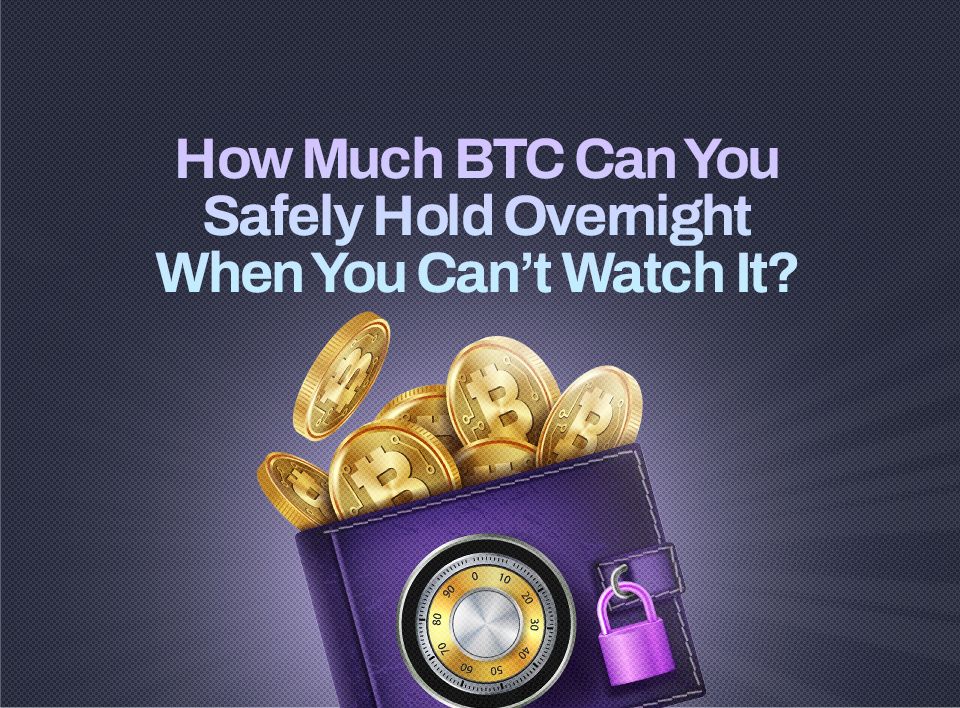The cryptocurrency industry is over a decade old and has come a long way from the launch of Bitcoin in 2009. The crypto market has seen the good, the bad and the ugly, yet it is still around.
Cryptocurrencies will likely stick around for a long time, especially as they keep evolving and becoming more accepted in the mainstream.
BlackRock, the biggest asset manager in the world, recently amplified this mainstream movement by applying for and receiving approval for the first-ever spot Bitcoin ETF in the U.S.
A spot bitcoin ETF is an investment you can buy and sell on the stock market. It follows the price of Bitcoin and allows you to invest in Bitcoin easily, like regular stocks.
Bitcoin on the stock market? Who would have thought? But here we are.
So, how do you get into cryptocurrency and become a crypto trader? This article will provide a step-by-step guide and the necessary steps to start.
Why Become a Crypto Trader?
Crypto trading has become a popular way to grow wealth, but what’s the big deal? Why should you consider it?
- Financial Independence: Trading cryptocurrencies gives you the flexibility to make your own money decisions without relying on traditional 9-to-5 jobs.
- 24/7 Market Access: Unlike stock markets that close after business hours, crypto markets run all day, every day. You can trade anytime, even at 3 a.m. on a Sunday!
- Portfolio Diversification: Cryptocurrencies offer an alternative asset class, making them a great way to diversify your investments.
- Low Entry Barrier: You don’t need millions to start. You can begin trading with as little as a few dollars or its equivalent in your local currency.
Types of Crypto Trading Strategies
Not all traders are the same, and that’s perfectly okay! Here are some popular trading styles to help you decide which path to take:
- Day Trading: This involves buying and selling cryptocurrencies within a single day. It’s fast-paced and exciting but requires sharp focus and quick decision-making.
- Swing Trading: If day trading feels too intense, swing trading might be for you. It involves holding positions for several days or weeks, riding the market’s waves.
- HODLing: The simplest strategy—buy and hold your crypto for the long term, believing its value will rise over time.
- Arbitrage Trading: This involves taking advantage of price differences for the same asset on different platforms. Buy low on one exchange, sell high on another.
Each strategy has its pros and cons, so test the waters and see what fits your personality and goals.
A Step-by-Step Guide to Becoming a Crypto Trader
Here are 5 steps you can follow to become a crypto trader:
1. Educate Yourself on Cryptocurrency
Before entering the crypto market as a trader, it is essential to know precisely what and where your money is going. Cryptocurrency has been around for over a decade; thus, a ton of information, including online courses, blogs, and whitepapers, is available for potential investors like you.
Find out everything you need to know about the crypto-blockchain market ecosystem. Read up on common crypto terms and the different trading types available. Watch YouTube videos about blockchain, NFT, web3 and cryptocurrency. Listen to crypto podcasts and follow thought leaders in the crypto industry on social media.
Whatever your preferred method of consuming information, ensure that you apply critical thinking to the shared knowledge. Remember, this is an investment, and the goal is to profit.
2. Choose a Reliable Crypto Exchange and set up your wallet
Selecting a reputable and secure cryptocurrency exchange is non-negotiable. Research different exchanges and read their reviews online. Look at the team behind the exchange.
On Obiex, you can buy and sell Crypto at competitive market rates, use p2p trading and swap crypto without waiting for blockchain confirmation.
Furthermore, as a cryptocurrency exchange, we have established solid infrastructure and strategies to safeguard our customers against hacks and other security breaches. Read more about how we secure your assets here.
Once you set up an account on a crypto exchange, you can create different wallets for different cryptocurrencies. On Obiex, you get access to over 15 cryptocurrency wallets. Create an account for free here.
3. Start Small and Diversify
Diversification means investing in different crypto assets.
For example, Stanley and Thelma each have $1500 to invest in their crypto portfolios. Thelma invests $100 across 15 different cryptos, while Stanley invests all the $1500 in one Crypto.
Stanley will have heavy losses if the market crashes or falls, while Thelma will likely lose less.
Splitting your portfolio into low-risk, moderate-risk, and high-risk assets is advisable. If you have more high-risk investments, there's potential for huge gains and equally huge losses.
Conversely, more low-risk assets will bring minimal losses but low returns. Regardless of your risk appetite, your portfolio should be as balanced as possible.
4. Take Risk Management Seriously
Risk management is one concept both beginners and seasoned traders must always prioritise.
As a new trader, you must understand the best way to manage risk. You must also set up a strategy that helps you minimise loss.
For instance, your risk management strategy can involve establishing strict rules on when to hold or sell. You could decide to sell only when a coin or token has risen 20% or hold as long as the coin doesn't fall below 15%.
In the crypto investment market, beginners should consider setting aside a specific amount of money for trading and using just a small part of it to make the first couple of trades.
This approach ensures that they will still have money to trade if their investment moves against them.
To provide further context, let's say you set aside $100 to trade.
Then you buy $20 worth of BTC in the hope that it will rise and you can sell it, but instead, the price falls terribly.
Despite this loss, you will still have $80 left to trade. To state the obvious, the loss would have been more severe if you had used all the $100 to buy BTC.
In essence, always have a risk management plan and some money set aside to offset any losses you may experience when investing in cryptocurrency.
5. Learn from Your Experiences
Expect a learning curve in crypto trading. Analyse your trades, identify mistakes, and learn from them. Continuously improving your strategies and skills will lead to better results in the long run.
Tools and Resources for Crypto Traders
To succeed as a crypto trader, you need the right tools in your arsenal. Here’s a quick toolkit to get you started:
- Trading Platforms: Reliable exchanges like Obiex give you access to buy, sell, and trade crypto safely.
- Charting Tools: Apps like TradingView help you analyze price trends and make informed decisions.
- Market News: Stay updated with crypto news sites, blogs, and newsletters. Knowledge is power!
The more equipped you are, the easier it is to navigate the market with confidence.
Trading Tips and Lessons from 5 Crypto Traders
Juwon, 7 years of trading experience
Don't be greedy if you want to keep your gains.
For the periods I tried to not be greedy and just take 10% every day, I made wins. But each time I was greedy, I had many losses.
Also, don't buy Crypto when there's hype in the market; buy when people want to sell.
A. Williams, 3 years of trading experience
Several lessons have stood out to me from my years of trading.
One, Patience - While some people make it quick in Crypto, others just have to go through that journey of consistent hard work before actually making real money, and I was one of them.
Two, Discipline - In the Crypto market, if you allow FOMO to rule your actions or do something outside your trading plan, it's likely to result in heavy losses.
Three, Contentment - I learnt that taking profit, irrespective of the size or amount, should be a top priority as no one knows the heart of market makers.
Four, Humility - No matter how much you make from trading, there's always someone richer and smarter than you. So to become better, learn from them.
Tony, 3 years of trading experience
Trading taught me patience. It sharpened my decision-making abilities, and I learned not to jump on everything you see in the crypto market.
Blessing, 2+ years of trading experience
I am impatient, but trading taught me to sit and wait and watch things play out as long as my analysis was done correctly.
Also, I now understand the value of little profits at a time. Most people just want to make a huge profit in a short time frame, but with trading, you learn to appreciate the little 2% here and there.
Williams, 2+ years of trading experience
Crypto trading taught me to trust my instincts more and know when to back down from things and look at them again, no matter how tempting it may be to continue pursuing them. Also, always take your profit and use Stop Loss.
Staying Safe in the Crypto Space
The crypto world can be a playground for scammers, but don’t let that scare you. Here’s how to protect yourself:
- Avoid Too-Good-to-Be-True Offers: If someone promises guaranteed returns or “secret investment opportunities,” it’s probably a scam.
- Secure Your Wallets: Use strong passwords, enable two-factor authentication, and consider cold wallets for long-term storage.
- Be Cautious Online: Watch out for phishing attempts or fake websites that look like your trusted exchange. Always double-check URLs.
When it comes to security, a little paranoia can go a long way.
Joining Crypto Communities
The crypto journey can get lonely, but it doesn’t have to be! Joining a community can keep you informed and motivated:
- Telegram Groups and Discord Servers: These platforms host active trading and crypto-focused groups where you can exchange ideas and tips.
- Reddit Threads: Subreddits like r/CryptoCurrency and r/Bitcoin are treasure troves of information.
- Twitter Spaces: Follow industry leaders and tune into live discussions for real-time insights.
Surrounding yourself with like-minded people can be both fun and educational. Plus, who knows? You might make some lifelong friends along the way.
Common Mistakes to Avoid as a Beginner Trader
Starting out can feel overwhelming, but avoiding these common mistakes can save you a lot of trouble:
- Emotional Trading: Don’t let fear or greed guide your decisions. Stick to your strategy, even when the market is unpredictable.
- Over-Leveraging: Leverage can amplify your gains but also your losses. Use it cautiously.
- Chasing Hype: Just because everyone is talking about a coin doesn’t mean it’s a good investment. Do your research!
- Ignoring Risk Management: Always have a plan to minimize losses, like setting stop-loss orders or only investing what you can afford to lose.
Remember, every trader makes mistakes, but learning from them is what sets you apart.
Extra Note: Regulations and Tax Implications
Crypto trading isn’t the Wild West anymore. Governments are catching up, so you must play by the rules.
- Know the Laws: Check the regulations around crypto trading in your country to avoid legal trouble.
- Understand Taxes: Depending on where you live, profits from crypto trading may be taxable. For example, some countries consider crypto gains as capital income.
- Get Expert Help: When in doubt, consult a financial advisor or tax professional to ensure you stay compliant.
Nobody likes tax season, but staying ahead of the game will save you a lot of stress.
To Recap
- Cryptocurrency trading offers a gateway to financial success. Like with any other investment or business venture, wins, losses, and lessons are part of the journey.
- If you're ready to start your crypto journey, join over 70,000 users on Obiex by creating an account today.
Disclaimer: This article was written to provide guidance and understanding. It is not an exhaustive article and should not be taken as financial advice. Obiex will not be held liable for your investment decisions.


